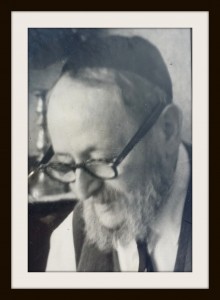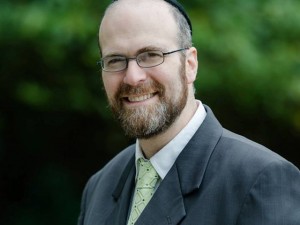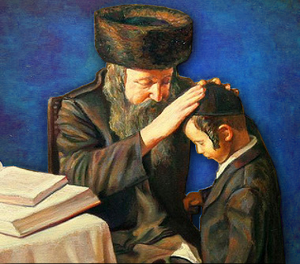by Rabbi Pesach Lerner & Rabbi Yaakov Menken
In a recent editorial in The Forward (“Be Fruitful and Multiply — Please?”, Dec. 12), Jane Eisner sets aside the Pew Report’s alarming statistics regarding non-Orthodox intermarriage and assimilation to focus upon fertility, which she terms “an even more fraught issue.” Yet it is unclear why she believes the decline in childbearing to be the dominant cause of the diminution of the non-Orthodox community, nor why begging women to have more children will contribute significantly to a reversal.
[This response was initially accepted for publication in The Forward itself, but subsequently they decided not to print it. We believe this an unfortunate decision both for The Forward and its readership.]
Eisner correctly states that non-Orthodox fertility hovers around 1.7 children per family, well below the replacement rate of 2.1. But Zero Population Growth will not preserve a Jewish community whose children are deserting it. The Pew Survey reports that fifty percent of married Reform Jewish adults have a non-Jewish spouse, and children of intermarriage are much less likely to be raised as Jews. Even beyond that, one-third of young Jewish adults raised as Reform Jews now classify themselves outside Jewish denominations. So in reality, Reform families must produce over four children on average (the Pew Survey’s assessment of Orthodox fertility) to simply maintain the Reform population, unless declining affiliation is addressed as well.
This is not to say that Ms. Eisner is wrong to take a hard look at the non-Orthodox decline. It is that she has deliberately ignored its primary factor, and overlooked the positive example set by another Jewish community in precisely that area.
The Orthodox always had a high fertility rate – but until shortly after World War II, Orthodox children often found their way into Conservative and Reform congregations. Today the overwhelming majority of young adults raised Orthodox retain their Orthodox affiliation and, of course, marry other Orthodox Jews.
Given Eisner’s deep concern about the decimation of the non-Orthodox community, it is noteworthy that we have seen scant (if any) examination in The Forward of what Orthodox families began to do differently. If The Forward wishes to make a positive contribution to the non-Orthodox future, it might begin by regarding the Orthodox less as a curious afterthought or a forbidding “other,” and more as brethren with a shared interest in Jewish continuity – and with much acquired wisdom to share.
This past summer, Eisner listed a series of stereotypes about Orthodox Jews, specifically Haredim: “We say that Haredim are misogynist, perhaps homophobic, possibly corrupt, [and] unduly swayed by their rabbis.” But negative caricatures should not influence how The Forward reports upon something as beneficial as Jewish fertility. A 2012 Forward editorial entitled “The Undeserving Poor?” questioned financial assistance of the impoverished who have children – not regarding those who choose to become single mothers and live on welfare, but hard-working Hasidic families staggering under the expense of feeding large broods and providing them with full-day Jewish schooling.
The non-Orthodox community has fought against any form of relief from the expense of private education. For the Forward to then malign Jewish families weathering financial double jeopardy adds insult to injury. Instead of censuring the fecundity of Hasidic parents, The Forward might note that increased aid for parochial education would have greatest impact upon non-Orthodox families, those which regard Jewish schooling as optional and for whom cost is therefore a significant factor.
Nor is The Forward’s negativity limited to substantive topics. A frequent contributor recently claimed that her Satmar mother was so focused upon picayune details that what “clinched” the marriage between her daughter and another Satmar woman’s son was that both women wore the same hair coverings. Shortly thereafter, the same writer conceded that the style in question is common to all Satmar women – rendering her portrayal of her mother at best a work of therapeutic but prejudicial fiction.
The Forward frequently publishes similar articles by non-Orthodox adults raised in Orthodox families, but rarely do we hear from the much larger number of adults who have moved in the opposite direction. Pew Research projects that over 110,000 Orthodox adults did not grow up Orthodox, and by most estimates, women constitute the majority of that figure. How does that reflect upon Eisner’s perception of Haredim as misogynist? Why would college-educated high achievers (of either gender) become blind adherents of corrupt homophobes?
Perhaps it is time for understanding to replace mockery. Would it not better serve The Forward’s readers if, among a plethora of recent articles about Sheitels, one came from a woman who wears one?
Though perhaps she would prefer to write about something more consequential than Sheitels. If current trends continue, the 110,000 adults who adopted Orthodoxy will have more Jewish grandchildren than the collective membership of today’s Reform or Conservative movements. But to learn how Orthodoxy’s rejuvenation might be relevant to the non-Orthodox world, one must acquire a more honest awareness of Orthodox beliefs and practices, especially in the area of raising our next generation.
Today’s Orthodox Jews know that to inspire children to stay Jewish, Torah must encompass our lives. It must be not merely part of our days, but our roadmap for life.
And so that is what we teach them. In shul they pray next to their parents as well as retirees, and see that we all study the same Torah, the Torah that has guided Jewish lives throughout our history.
Of course, we send them to Jewish schools. A “dual” curriculum is demanding educationally and financially, but Jewish education through High School is the best method of retaining Jewish commitment into adulthood. It is well worth the sacrifice.
When it comes time for young men and women to seek a marriage partner, they invite parental involvement – because they are seeking not merely to fall in love, but to find someone with whom to build a family and future upon a vibrant past. Each couple starts the process over again, thus preserving the Jewish people.
Is there a way to capture some of that inspiration and commitment, without being Orthodox? One thing is certain: searching for the answers is a far more productive approach than belittling Orthodox successes – and begging for children.
 As the Rav of his shul, Rabbi Dovid Katz shlit”a, pointed out last night, Rav Hertzberg would also speak truth to power. He was fired from rabbinic posts for being too honest — until a group of devoted followers created a synagogue, named for his father Avraham zt”l, and set him up as their Rabbi.
As the Rav of his shul, Rabbi Dovid Katz shlit”a, pointed out last night, Rav Hertzberg would also speak truth to power. He was fired from rabbinic posts for being too honest — until a group of devoted followers created a synagogue, named for his father Avraham zt”l, and set him up as their Rabbi. 




